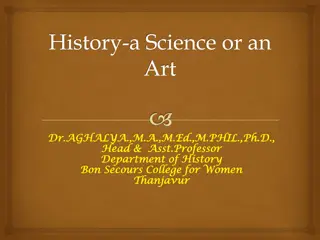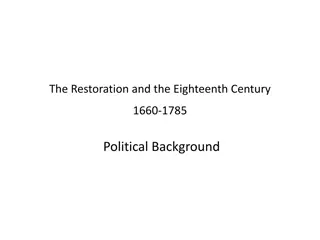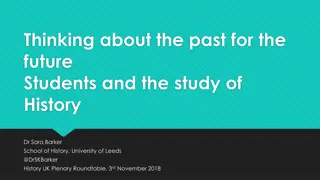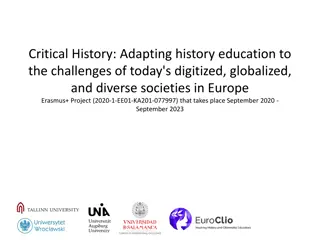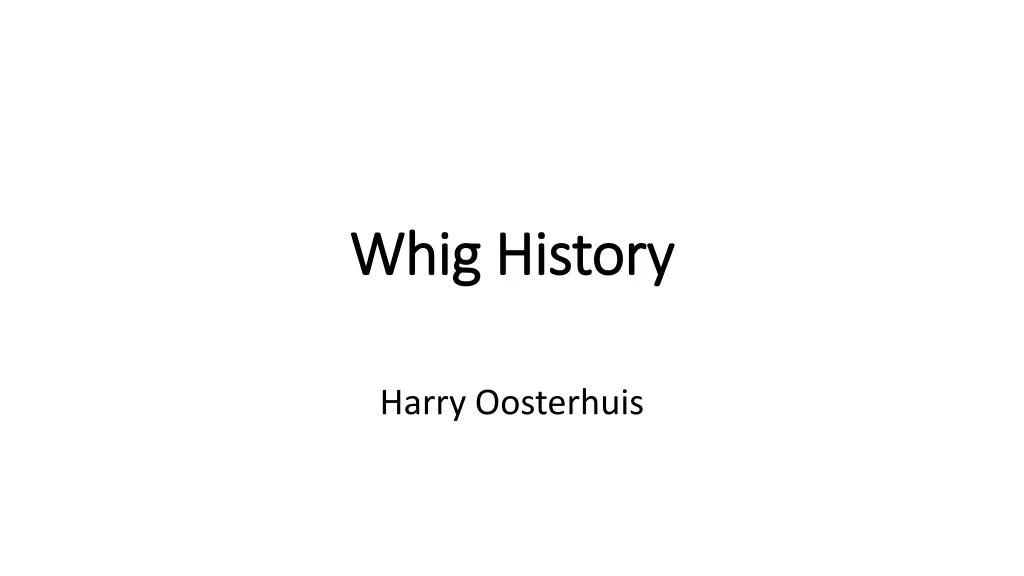
Whig Interpretation of History and Butterfield's Critique
Explore the Whig interpretation of history that portrays a progression towards enlightenment and democracy in British politics, contrasted by Butterfield's critique of its flaws. Delve into the complexity of historical narratives and the need to appreciate the past on its terms, devoid of presentist biases.
Download Presentation

Please find below an Image/Link to download the presentation.
The content on the website is provided AS IS for your information and personal use only. It may not be sold, licensed, or shared on other websites without obtaining consent from the author. If you encounter any issues during the download, it is possible that the publisher has removed the file from their server.
You are allowed to download the files provided on this website for personal or commercial use, subject to the condition that they are used lawfully. All files are the property of their respective owners.
The content on the website is provided AS IS for your information and personal use only. It may not be sold, licensed, or shared on other websites without obtaining consent from the author.
E N D
Presentation Transcript
Whig Whig History History Harry Oosterhuis
Butterfield, H. Butterfield, H. (1931). (1931). The Whig Interpretation of history The Whig Interpretation of history. . G Bell and Sons. G Bell and Sons. Background: why Whig ? 18th- early 20th century in British politics: Tories traditional/conservative authoritarian government Whigs liberal/enlightened constitutional parliamentary government Whigs: Tories are backward, we have the forces of history (= inevitable progress towards constitutional monarchy and liberal democracy) on our side.
Whig political history Adopting the present (England: constitutional monarchy, parliamentary democracy, liberties and civil rights) as the normal standard. Projecting that standard onto the past the political history of (Protestant) England is the inevitable continuing progressive march from oppression, immaturity, religious superstition and reactionary Catholic and Tory dominance towards (Protestant and secular) enlightened- rational and open-minded liberal democracy.
Butterfield: Whig historiography is deeply flawed and misleading, it is presentist and teleological: One-sided/colored, highly selective and simplified, distorting, moralistic, based on black and white thinking. Unhistorical: tells us more about the present than about the past as it really was; as if the past was not more than a preparation for the present The past is different from the present ( a foreign country ); people in the past are unlike us understand people and events in the past in their own context ( relative to time and circumstance ) and not according to the standards and values of the present. The past is not moving in one direction from unfolding origins towards some sort of preset goal (telos) the pandemonium of the past: complex, ambiguous, confused, chaotic. Historical change is not an all-encompassing uniform advance, but a mishmash of accidental, unintended, contingent, often contradictory events and developments ( intricate network of interactions ) history has no general laws, no inherent meaning ( no voice of its own ) or universal truth (Butterfield: don t confuse concrete history with abstract philosophy ). The past should not be judged (and dramatized) in terms of good versus evil; backwardness versus progressiveness; supporters versus opponents of modernism; darkness versus light, heroes and villains No black or white, but endless shades of grey.) Study, describe and explain the past for the sake of the past, in its own context, instead of using it to legitimate and celebrate particular achievements or endeavors in the present.
Whig history of science Ignorance, myth, superstition, religion science: true knowledge progress Irrational and subjective non-science rational, objective and useful knowledge based on solid scientific method and verification Based on tradition, faith, ideology Basic assumption of Whig-history of science: there is only one correct and objective way to understand the world (the scientific method) and scientific truth is timeless and autonomous (ideal of pure science), apart from culture, ideology and society therefore knowledge in the past can be judged according to the same standards as knowledge in the present. What is considered as scientific facts and knowledge may change in history: scientific knowledge is not mirroring reality as it really is but it is based on a framework (paradigms (Thomas Kuhn)) of presuppositions, definitions, hypotheses, postulates, theories, which are shared by scientists but which may change or replaced by others and which are related to specific contexts.







